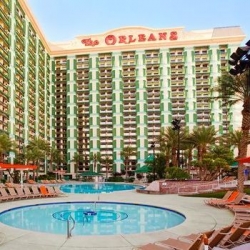
A Las Vegas coroner determined the man’s death was an accident, but the family claims it was due to negligence on the part of the casino.
The family of a man who died from a fall at The Orleans sued Boyd Gaming, the owner of casino. Paul Neiswander, 63, from Fairfax, Virginia died in the Las Vegas hotel back in November 2017 after he fell from an escalator which took people into the casino area of the resort.
On February 15, the man’s family has filed a wrongful death lawsuit against the Boyd Gaming Corp. property. The family’s legal briefs claimed that the elevator suddenly stopped, which caused Neiswander “to plummet several feet, resulting in life threatening injuries.”
Neiswander died from hypertensive cardiovascular and blunt head trauma that resulted from the fall, according to the Clark County coroner’s office. The family believes negligence played a role, though the coroner ruled his death was an accident.
According to the family’s suit, The Orleans and Otis Elevator Co., the company that supplied the escalator, neglected to properly maintain the escalator. The plaintiffs claim both failed to ensure that the escalator’s parts were properly installed.
The lawsuit requests at least $15,000 in damages, as well as covering the financial loss of medical and funeral expenses, attorneys’ fees and punitive damages. Neither Boyd Gaming nor Otis has made a public comment on the pending litigation.
Not the First Deadly Lawsuit
It is still too early to know how the Neiswander escalator lawsuit will turn out, but this is not the first time The Orleans Casino has been accused of negligence. Back in February of 2007, three maintenance workers entered a manhole located in the Orleans and only one of them came out alive. Maintenance worker Richard Luzier went down the manhole in order to fix a pipe and was overcome with toxic fumes.
Two other workers, Travis Koehler followed by David Snow went in to save Luzier but all three ultimately fell unconscious. Though Snow recovered after spending time in critical condition, Luzier and Koehler unfortunately died. Travis Koehler’s parents, Debra Koehler-Fergen and Robert Koehler, filed a wrongful-death lawsuit against the Orleans owner Boyd Gaming the following year.
Worker’s Family Claimed Neglect
The 2007 showed neglect on the part of the casino, but that was not the threshold the plaintiff’s lawyer had to cross. Nevada state courts make it difficult for workers and workers’ families to win workplace accident lawsuits against employers. Workers’ compensation laws bar employees from holding employers responsible for workplace injuries and fatalities. The only way around it is if they can prove that the employer intentionally caused the act or harm, which is a high bar in a lawsuit.
George Bochanis, the Koehler family’s attorney, claimed that that just might be the case for this incident. Bochanis said in a recent interview, “This is different because it was by definition an intentional and purposeful act.”
OSHA Backed Plaintiff’s Claim
The lawyer might have a point. Nevada Occupational Safety and Health Administration (OSHA) inspector stated that Boyd has “willfully” disobeyed safety laws. This is a rare find in Nevada and means that Boyd allegedly knew that what it was doing was dangerous and a violation of safety laws, yet they continued to allow the faulty escalator to continue in operation anyway.
According to the OSHA inspector, Boyd repeatedly has been warned about the dangers that come with the confined spaces of manholes and the lack of having a policy in how to deal with them. However, despite knowing this no corrective action was taken.
Despite the repeated warnings, OSHA downgraded the citations to “serious” violations in an unusual settlement that involved top state political appointees. The process typically is confined to regulators alone. Nevada OSHA upheld their denial in having any fault in the matter, despite their lack of enforcing policy changes in the knowingly dangerous violations.
OSHA’s 2007 Claims about Boyd Gaming
OSHA’s problem was not so much proving whether Boyd Gaming denied and neglected safety warnings, but whether the 3 men were forced to complete a job that required them to enter the manhole despite knowing that it was dangerous.
The OSHA inspector cited witnesses who said the supervisors yelled for Koehler to go in after Luzier, then they called for Mr. Snow to go in after Koehler and Luzier. However, the supervisors claimed that the three men jumped in without instructions to.
The court’s remarks on the case showed the high bar – and quite unreasonable – that plaintiffs have to meet. In the judge’s opinion, “The relevant inquiry is not the degree of negligence or even depravity on the part of the employer, but the more narrow question of whether the specific action that injured the employee was an act intended to cause injury to the employee.”
Nevada Compensation Attorney Speaks
Ray Badger, a Carson City workers’ compensation attorney, said, “You would need fabulous facts of total safety disregard, and even with that you would have a great chance of losing. Absent an assault, how can we prove that they intended to injure someone?”
To prove neglect on the part of Boyd and OSHA was proven beyond a doubt, even in the judge’s words. Yet the key issue became more about whether or not it was with malicious intent.
Mr. Bochanis said, “You know this workplace is dangerous and deadly and you were told about it. Yet, you sent three people down there. We’re not claiming they were murderers, but what they did was knowingly dangerous and had to be intentional.”
